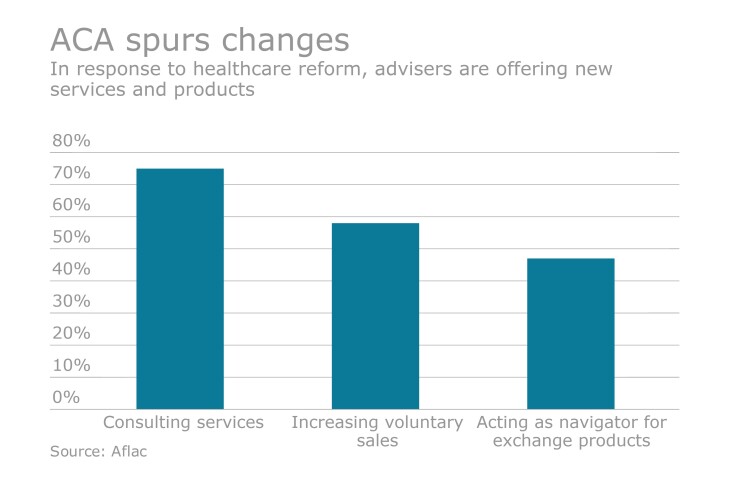The Affordable Care Act is putting the "broke" in "brokers."
Blaming a slew of new ACA-driven costs, several Blue Cross Blue Shield insurers just announced that they would no longer give brokers commissions for selling individual health plans. The move follows similar decisions by other major carriers, including UnitedHealth and Aetna, to cut broker compensation.

The ACA's damage doesn’t stop there. Insurers may exit the public healthcare exchanges if they keep losing money. That would leave brokers with fewer options to offer clients.
The ACA's problems stem from wishful thinking. The law's architects sought to cover the generally costlier care of the elderly by requiring the young and healthy to buy insurance. The premiums from the latter, who don't consume much care, were supposed to offset the cost of treating the former, who do tend to visit the doctor more frequently. But fewer young people—and more older and sicker people—have enrolled than expected.
As a result, premiums and deductibles on the exchanges have soared. This year, some of the most popular ACA plans saw double-digit premium increases, and many plans only offer narrow networks of doctors and hospitals. That's further discouraging people, and the young in particular, from signing up for insurance.
Penalties without punch
The IRS penalty for going without insurance was supposed to provide a further incentive to enroll, but it’s been ineffective. Seven in 10 uninsured Americans avoided the penalty last year, usually by saying that they couldn't afford coverage. Others found that paying the penalty was cheaper than buying insurance.
Still others are cheating the system by abusing Obamacare's special-enrollment periods, which allow people to get coverage outside of the standard open-enrollment period if they claim a hardship. But the federal government hasn't verified these claims, in most cases. So many folks are signing up and then dropping coverage immediately after their insurer pays their bills.
Consequently, insurers have suffered huge losses. UnitedHealth, the nation's largest insurer, lost $720 million on the ACA's exchanges in 2015. Blue Cross Blue Shield lost $866 million; Aetna, $140 million. Humana just announced that its profits fell 30 percent in the last quarter of 2015.
Unsurprisingly, UnitedHealth has threatened to withdraw from the exchanges in 2017. Humana, Cigna, and several Blue Cross Blue Shield affiliates in five states are contemplating doing the same.
All this marketplace discord has already hurt brokers. One New York adviser recently lamented to Westfair Business Publications, "A vast majority of my clients lost their coverage." Another New York broker noted that the exchanges are so "cumbersome and time consuming that it is simply not worth the time investment needed [to assist someone]."
Such problems shouldn't come as a surprise. Brokers have been reporting problems since the very first enrollment period. In one survey, nearly one in three reported the law had directly hurt their business. One in four brokers expressed concerns about premium stability—which has proven prescient.
The dysfunction afflicting the Affordable Care Act's exchanges is symptomatic of the entire law's failure. The next president and Congress must work together to repeal Obamacare and replace it with healthcare reform that relies on market competition, not government fiat, to deliver accessible, affordable, high-quality care.





